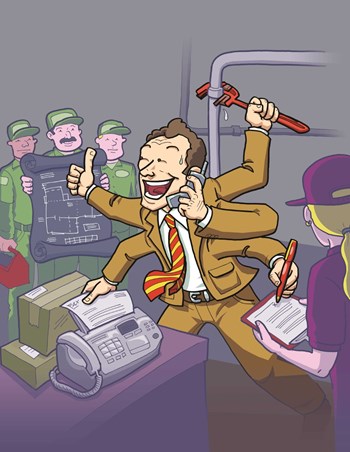
Clear and open communication between a condo or HOA board and its manager keeps a community running like a well-oiled machine, with roles defined and followed.
Strains in that relationship can cause breakdowns in the machine, and spell conflict for the community as a whole. Understanding how to keep the relationship between managers and their boards problem free is crucial to any community that aims to be efficient and productive. Experts agree that the main way to avoid conflict is for the board of directors and the property or community management professional to each know their role.
The Board's the Thing
HOA governing documents and the statute [718 for condos and 720 for HOAs in Florida] require that the community is run by the directors,” says Sue Carpenter, CEO of Associa Community Management Professionals Inc. in Orlando. The board’s primary role then is as the community’s decision-making entity.
That includes numerous tasks for the board, including enforcing community documents, rules and penalties; establishing sound fiscal policies and accurate records; developing a workable budget and establishing reserve funds; authorizing legal action against owners who do not comply with the rules; reviewing local laws before passing rules or sending bylaws to membership for approval; appointing committees; selecting an attorney, an auditor, insurance agent and other professionals; providing adequate insurance coverage; keeping board members informed, and attending and participating in community meetings.
“The members of the board of directors have a fiduciary relationship with the members of the association,” says Christy Borden, a manager with Leland Management, Inc. in Orlando. This fiduciary relationship imposes obligations of trust and confidence, and requires the members of the board to act in good faith and in the best interests of the members of the association, she adds.
In acting upon these responsibilities, the board hires a manager to give their decisions legs, as it were. “The role of the community association manager is to implement the decisions of the board, administer the services, programs, and the operation of the association within the policies and guidelines set by the board,” says Borden. Part of that role is to provide status reports and ensure compliance within the association to governing documents and state and federal laws.
The manager also serves as a consultant to the board, providing industry best practices, and making suggestions to best implement the board’s decisions. The manager may provide training, if necessary, to inexperienced board members.
Simply stated, the role of the board is to govern and set policy, and the role of the manager is to carry out board directives and manage the daily business of the association, says Bill Worrall, vice president of The Continental Group Inc. in Hollywood. If these roles are properly understood and carried out, conflict should be kept to a minimum. “Ultimately the responsibility to carry out tasks or handle issues rests with the board,” he adds.
“[Boards] are the decision makers and where the ball stops,” agrees Carpenter. “They can hire a management company to handle its administrative functions, but not the decision making.”
In order to eliminate misunderstandings in the relationship between board and manager, it is crucial to have proper management operating procedures that are approved by the board of directors, says Borden. “They provide continuity to the operations, as well as give the manager the tools they need in order to be productive,” says Borden. And when a conflict does arise, the first step to solving it is to communicate and clear up the expectations of each party.
When Conflicts Arise
When the dynamic between board and manager is clearly understood and followed, a productive team is formed, performing its functions in the assembly of a well-run community. However, conflicts do inevitably arise.
There are times when a manager may feel they know which direction a community should go in better than the board, says Gary van der Laan, director of manager development for Leland Management Inc. “Managers need to remember that their role is to offer guidance to the board, not to set policy. They need to avoid dictating to the board what should be done. Instead the manager should provide the board with information and documentation to support each side of an issue.”
On the other hand, board members must also remember that the purpose of the board is to make decisions, not run operations. To avoid slowing down the process of running an association, once a decision is made the manager must take that decision and do everything they can to successfully implement it, adds van der Laan. “Likewise, board members who may have not been in favor of the decision should also fully support the decision and present a united front to the community.”
One example of a community conflict offered by the experts outlined an activities director who was well-liked personally by the board members, and who began taking on the functions of the licensed manager. The manager brought these issues to the board’s attention but was seen as trying to make the activities director look bad. A problem involving personalities like this can often be tricky, but going back to the main point of knowing your role helped to solve it. The manager and board held a special meeting and reviewed the management contract and the employment contract of the activities director. A clear scope of work was created which outlined the day-to-day functions and assigned each area to one party or the other. Each task assigned had a time frame for completion and a reporting requirement by both. This solution, and clear delineation of roles eliminated the feeling on each side of being “thrown under the bus” by the other.
No matter what the conflict, the manager follows the instruction of the board, “unless it’s illegal or not a contractual obligation,” says Carpenter.
After all, the community is the property of board and the association, adds Borden. “If they want red flowers and [the manager] prefers purple, it isn't worth the argument.”
Avoiding Conflict
To ensure the relationship between manager and board stays healthy, there are certain jobs a manager should never take on, the experts agree. “The manager should not take on anything without board approval, including signing contracts, instituting legal procedures or starting or committing to projects,” says Carpenter.
Any task that could be construed as a conflict of interest, even with full disclosure to the board, should be avoided, as it could create distrust among the community. One example that often arises is when residents will ask the association manager to recommend a vendor to repair their personal property, says Borden. “There is a liability concern with making a recommendation if the resident isn't satisfied with the vendor's work.”
Managers then must be sure to know when to call in the board, or another professional. “When an attorney, CPA, engineer or other professional is needed, the manager must have the experience and confidence to refer the subject to another professional,” says van der Laan. “Equally, those professionals need to know when a community manager is best able to assist a board.” Again, it all comes down to knowing your role.
Another way to keep problems out of the relationship is to know when collaboration from the board and manager is more crucial. “Capital improvements that require a large sum of budgeted money that change or add to the common property owned by the association, such as building a new clubhouse,” require extra collaboration, says Borden.
Any major project being undertaken by the association as a whole should include both board members and management to share ideas. “Board members rarely possess the broad range of experience in association matters to fully implement a major project,” says van der Laan. “The manager is often the best person available to understand how various board members or committee members’ areas of expertise can be put to the best use.”
Mutual Understanding
Ultimately, communities function best when the board and manager have clear definitions of their roles and responsibilities. Always remember that while a manager can make suggestions and offer guidance, decisions for the community are in the hands of the board, and the manager should implement those decisions, despite personal and professional opinions. Managers should be willing to collaborate, share knowledge and experience, but also be willing and ready to accept when a board decides not to go along with their recommendations. The board should equally respect the manager, recognizing them as the expert and the entity in charge of community operations.
When conflicts aren’t resolved, the outcome is not dissimilar from the repair of a machine. One part is often changed. “Conflicts between the board and manager do not reconcile to the healthy and productive operation of the community association,” says Worrall. “Therefore, and typically, the board would terminate the employee / contractor [i.e. the manager] in favor of a new employee / contractor who will execute correctly and as the board desires.”
Crystal Proenza is a freelance writer and the director of marketing for one of the leading commercial real estate firms in South Florida.






Leave a Comment